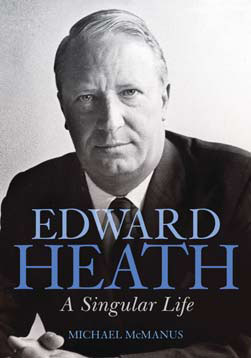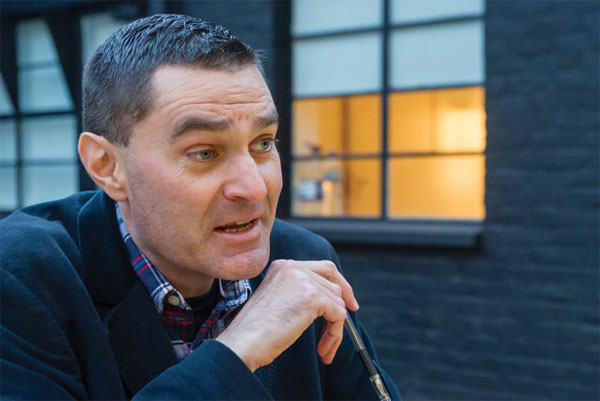The leader China never forgot
In new biography, author recalls former prime minister Edward Heath's meetings with nation's legendary figures
Michael McManus believes Edward Heath was a pivotal figure in China's opening up to the West.
The former British prime minister - who is the subject of the author's new biography - famously first met with Chairman Mao in 1974 and was a regular visitor thereafter to the country that has since become the world's second-largest economy.
"They (the Chinese) respected him probably more than anyone apart from Nixon or Kissinger. He was saying we needed to take China seriously and start parlaying with them to realize the economic and political power there is there," he says.
|
Michael McManus says Heath was always a celebrity statesman in China. Nick J.b. Moore / For China Daily |
McManus, speaking in an open air cafe near his home in Southwark in central London, says Heath always had a sense of the big global picture.
"Heath and Kissinger understood in the 1970s that you have this obvious enemy, which was then the Soviet Union, and that China needed to be dealt with separately. It is a classic Napoleon principle of international diplomacy. There was a natural tendency for state socialist countries to gather together but there was a recognition that China had its own different interests."

McManus, who was political secretary to Heath for the five years up to 2000, has spared the former leader no blushes in a highly revelatory biography.
At first glance, Edward Heath: A Singular Life, appears to be a hagiography, with long passages of reminiscences from people who knew him best, but these often provide very personal information.
They include details such as the dyeing of his hair brilliant white (despite a brief dalliance with strawberry blond), insisting his assistants carried with them a bottle of malt whisky when traveling as essential medicine and also insights into his much-debated sexuality.
"Quite a lot of his friends and advisers have died but there is still a few around. I thought this was the last opportunity to get from them firsthand accounts."
The writer believes this gave him the opportunity to produce a rounder picture of his subject than either of his most recent biographers - John Campbell and Philip Ziegler - had provided.
"I wanted to get to the core of the man much more. I think John Campbell didn't know Heath. Philip Ziegler worked with him for a time at the Foreign Office in the 1960s but nobody who really knew him had ever written a book about him."
McManus says the visit Heath made to China in 1974, during which he met Mao, had personal significance for his former boss.
He was almost uniquely treated as head of government, even though he had just lost a general election and was only leader of the opposition.
"It had been an otherwise awful year for him. He had lost office, the IRA bombed his house and his godson died in the Morning Cloud disaster (when Heath's racing yacht sank)," he recalls.
"The one positive thing was this amazing trip to China, where he met these legendary figures, Zhou Enlai and Mao, and was treated as an international statesman."
McManus, who took a first in philosophy, politics and economics at Oxford University, began his career working in the political section of the Conservative Research Department.
When he worked for Heath as political secretary one of his tasks was to persuade him to write his much-awaited memoirs. The former prime minister had already had to return an advance from a publisher with them being almost two decades overdue.
"The process was descending into farce. I said to him, 'Do you want me to do it?' He said yes and I said, 'OK, but you must cooperate. I am not going to mess about'," he recalls.
"He didn't normally respond well to being told what to do but he eventually said defensively, 'Yes, of course.'"
The much-awaited autobiography, The Course of My Life, drafted extensively by McManus, came out the following year and was well received.
"The fact it happened at all got an extra star. It was worth a star for just happening. I wouldn't say I am proud of it because it wasn't my book, but I am proud of the achievement of getting it done."
After leaving Heath's employment, the writer stood for parliament himself as a Conservative candidate before working for, among others, the public relations consultancy Bell Pottinger. He became a full-time writer in 2014.
He is planning to follow up his biography with a political play based on Heath, who was also a world-class yachtsman, winning the Sydney to Hobart race in 1969, as well as an accomplished musician.
"It would be about him. I think there would be a lot of humor in it because I tried to get a lot of humor in the book."
One startling aspect of the book is when McManus comes to the conclusion he did not actually like Heath.
"Somebody came up to me the other day and said he was moved to tears by the bit where I tried to decide whether I liked him or not. I respected him, even was quite fond of him, but didn't naturally warm to him."
Heath remains a relevant figure in modern UK politics, since last June's Brexit decision by the British people undid his greatest legacy of leading the UK into what was then the European Economic Community in 1973.
"He was Mr Europe so Europe was always right, even when it was wrong. He backed himself into a corner on the subject and became out of touch with his own party on the issue. It was frustrating for those of us who worked with him because he became intemperate on the subject," he says.
McManus, who accompanied Heath on three visits to China, says he wasn't always that polite in private about some of the food he was served on his visits.
"Some of the things made him go a bit pale, especially those that came bubbling up in the soup that might have been better left in the sea. He was the model of a good guest because the hospitality was so good and he tried not to let it show."

Heath, a lifelong bachelor, is currently subject to a controversial ongoing investigation by Wiltshire Police for alleged historical sex offenses, the evidence for which one leading criminologist described in The Guardian in November last year as "fantastical".
"I think he was actually asexual. I don't like the word because it almost dehumanizes someone but he was as close to it as anyone I have ever known," he says.
"His closest friendships were generally with women, including Katharine Graham (the late proprietor of The Washington Post)."
Heath continues to have a China connection with his house Arundells in Salisbury - one of only three 20th Century British prime minister homes open to the public - being saved by an injection of funding by Beijing-based businessman Peter Batey, also a former Heath political secretary.
"I think he just felt like a big man in China. Every time I went with him - and he was an old man by then, without any real influence - he was treated with this sort of reverence by the Chinese," he says.
"He was a celebrity statesman, who had the red carpet rolled out for him, and always meeting someone in the top three or four of the hierarchy."
andrewmoody@chinadaily.com.cn
(China Daily European Weekly 02/10/2017 page32)



















